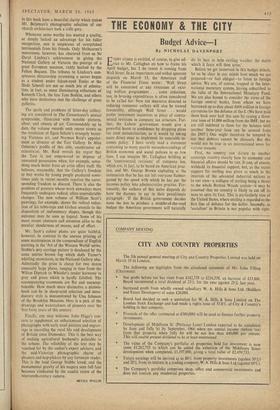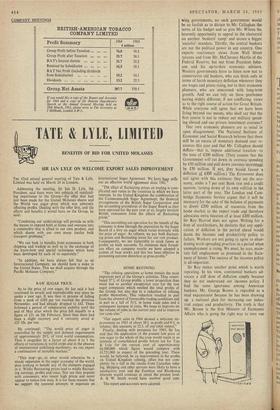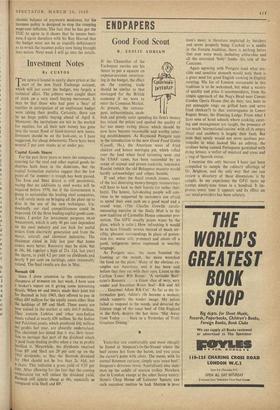THE ECONOMY & THE CITY
Budget Advice-1
By NICHOLAS DAVENPORT
EI VERY citizen is entitled, of course, to give ad- vice to Mr. Callaghan on how to frame his April budget, but 1 do resent it coming from Wall Street. In an impertinent and withal ignorant dispatch on March 15, the American staff of the Financial Times wrote: 'Wall Street will be concerned at any extension of exist- ing welfare programmes . . . some reduction, too, in housing expenditures is often considered to be ca:led for. New tax measures directed to reducing consumer outlays will also be viewed favourably, although Wall Street . . . would prefer investment incentives in place of contro- versial revisions in company tax structure. Fur- ther, the Labour government would give a powerful boost to confidence by dropping plans for steel nationalisation, as it would by taking more direct steps- to implement its venerable in- comes policy.' I have rarely read a statement containing so many puerile misunderstandings of British economic and social policies in so few lines. I can imagine Mr. Callaghan bridling at the 'controversial revisions' of company tax, which are, in fact, to be based on American prac- tice, and Mr. George Brown exploding at the insinuation that he has not left everyone flabber- gasted by the speed with which he has put the incomes. policy into administrative practice. For- tunately, the authors of this naive dispatch do have the decency to say in their penultimate paragraph: 'If the British government decides none the less to produce a middle-of-the-road budget the American government will naturally
do its best to help sterling weather the storm which it fears will then arise.'
Before we get immersed in this budget debate, let us be clear in our minds how much we are prepared—or feel obliged—to listen to foreign advice. We arc, of course, trapped in the inter- national monetary system, having subscribed to the rules of the International Monetary Fund. We are also bound to consider the views of the foreign central banks, from whom we have borrowed up to date about £600 million in foreign currencies for the defence of the £. (We have paid them back over half this sum by raising a three- year loan of $1,000 million from the IMF, but we are still indebted to them for the balance until another three-year loan can be secured from the IMF.) One might therefore be tempted to say that debtors cannot be choosers. But this would not be true in an international sense for various reasons.
First, no country can dictate to another sovereign country exactly how its economic and financial affairs should be run. It can, of course, withhold its financial support, but, as the recent support for sterling was given as much in the interests of the advanced industrial nations as in our own—a collapse of sterling being a threat to the whole Bretton Woods system—it may be assumed that no country is likely to cut off its nose to spite its face. This is particularly true of the United States, where sterling is regarded as the first line of defence for the dollar. Secondly, as 'socialism' in Britain is not popular with right-
wing governments, no such government would be so foolish as to dictate to Mr. Callaghan the terms of his budget and so give Mr. Wilson the heavenly opportunity to appeal to the electorate on another `bankers' ramp' and secure a bigger `socialist' mandate. Thirdly, the central bankers are not the political power in any country. One expects reactionary views from Wall Street tycoons and from Mr. McChesney Martin of the Federal Reserve, but not from President John- son and his up-to-date economic advisers. Western governments have to listen now not to conservative old bankers, who can think only in terms of harsh monetary deflation whenever they see wages and prices rising, but to their economic planners, who are concerned with long-term growth. And we can rely on these gentlemen having widely different, if not conflicting, views as to the right course of action for Great Britain. While everyone will agree that we have been living beyond our means, who shall say that the first course is• not to reduce our military spend- ing abroad and our private investment overseas? . Our own economic planners are as usual in open disagreement. The National Institute of Economic and Social Research believes that there will be an excess of monetary demand over re- sources this year and that Mr. Callaghan should deflate—that is, impose additional taxation—to the tune of £200 million. (They assume that the Government will cut down its overseas spending by £50 million and pull down overseas investment by £50 million. If not, they 'would favour a deflation of £300 million.) The Economist does not agree with this estimate; they see the eco- nomy, under a 7 per cent Bank rate and a credit squeeze, turning down of its own volition in the latter part of the year. The London and Cam- bridge Economic Service argues that it will be necessary for the sake of the balance of payments to divert £200 million of resources from the home market to the export trade and therefore advocates extra taxation of at least £200 million.
Sir Roy Harrod does not agree. Writing for a firm of stockbrokers, he declares that any appli- cation of deflation in the period ahead would
doom the incomes and productivity policy to failure. Workers are not going to agree to aban- doning work-spreading practices in a period when unemployment is rising. We must, he says, main- tain full employment as promised in the State- ment of Intent. The success of the incomes policy is all-important.
Sir Roy makes another point which is worth repeating. In his view, continental bankers ad- vocate a stiff dose of deflation simply because they do not understand our incomes policy. I find the same ignorance among American bankers. Mr. George Brown is regarded as a mad expansionist because he has been drawing up a national plan for increasing our indus- trial output and productivity. The truth is that Mr. Brown is the first Minister of Economic Affairs who is going the right way to cure our chronic balance of payments weakness, for his incomes policy is designed, to stop the creeping wage-cost 'inflation. The fact that he has got the TUC .to agree to it shows that he means busi- ness..11 agree therefore with Sir Roy Harrod that the budget must not be so stupidly deflationary as to wreck the incomes policy now being brought into action. Next week I will go into the details.
















































 Previous page
Previous page